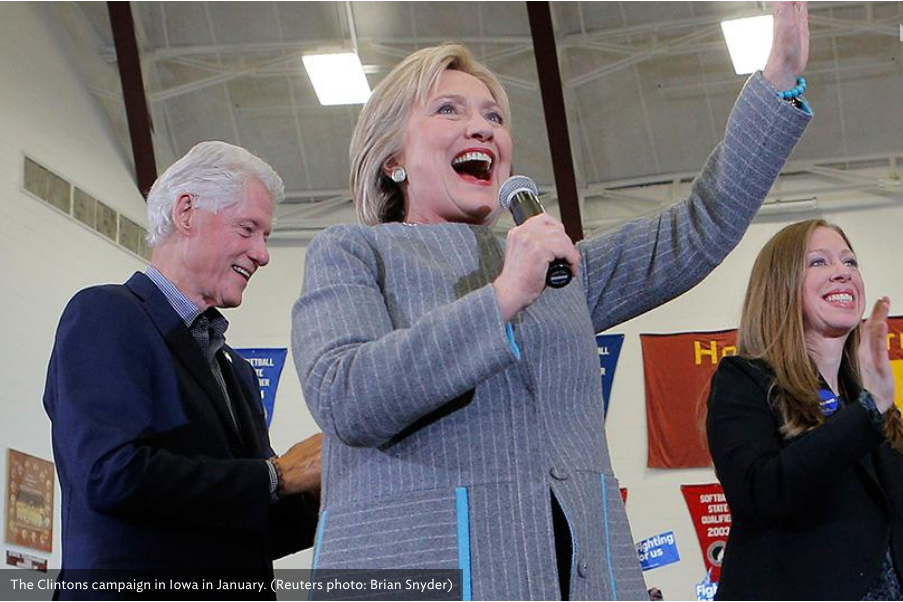The ‘Transactional’ Nature of Clinton Inc.
‘Doug is very transactional.”
This was an apt description of Doug Band, Bill Clinton’s longtime right-hand man and the figure at the center of the latest WikiLeaks revelation.
The quote comes from an unnamed former White House colleague of Band’s in an illuminating 2013 New Republic profile by Alec MacGillis.
Band, who touts himself as the founder of “Clinton Inc.,” started out as a White House intern. He turned down higher-status jobs to focus on being the “body man” for President Clinton. In politics, a body man is the guy (or gal) whose only job is to make sure the principal is happy, comfortable, and treated with the maximum amount of respect. No task is too small or too humiliating for a president’s body man. If POTUS wants a bowl of green M&Ms, green M&Ms it is. But it was also Band’s job to make sure no one wasted Clinton’s time. In short, he was the gatekeeper, the handler, the problem-solver. Like a royal valet, he anticipated the president’s needs before Clinton even articulated them.
Band recognized what throne-sniffers have known for millennia: Proximity to power can be lucrative.
When Clinton’s reputation was in tatters at the end of his presidency, thanks mostly to the Monica Lewinsky scandal and Clinton’s outrageous midnight pardons of felons and friends, Band turned down a job at Goldman Sachs to stay with Clinton. Equipped with a law degree he earned at night, Band was like Tom Hagen in The Godfather — a lawyer with a “very special practice” handling exactly one client.
It was Band’s idea to launch the Clinton Global Initiative, an amorphous pseudo-charity adjunct to the Clinton Foundation whose main purpose was to pull celebrities, CEOs, government officials, and various charitable organizations together into one giant confab where Bill Clinton was the star attraction.
The appeal for Clinton was obvious. He loves talking. He loves riffing on wonky solutions — real and alleged — to various public-policy problems. He also adores hobnobbing with the rich and famous and being praised by them. And he has a deep-seated need to be relevant.
Band recognized that all of these needs could be monetized, and that he could get his cut. In the memo released by WikiLeaks, Band explained how he did it. If you wanted a speech, an endorsement, a meeting with the big guy, you had to go through the little guy and pay the appropriate tribute, not just to Clinton but often to the foundation as well.
In 2011, along with Declan Kelly, a longtime fundraiser for Hillary Clinton, Band set up a company, Teneo, to fully exploit this system — with a much bigger payday for himself. He steered tens of millions to the Clintons and their foundation, as well as lavish “in-kind services for the president and his family — for personal travel, hospitality, vacation, and the like.”
The New Republic’s MacGillis is too credulous on one score. Bill Clinton, MacGillis writes, “was notoriously blasé about financial matters.”
“He doesn’t care about money,” a Clinton friend told MacGillis. “He doesn’t even have a credit card. When he wants to get something, he says, ‘Wow, I love that,’ and whoever he’s with says, ‘Here it is!’”
Charity was the price the Clintons had to pay — to get Bono and Bill Gates to show up, and pay up.
This isn’t proof Clinton doesn’t care about money so much as it’s proof he takes it for granted. It’s a pristine example of Clinton’s aristocratic entitlement. In medieval societies, the nobility looked down on money not because they didn’t care about being rich, but because they had little people to sweat the details.
For years I’ve been making the point that the Clinton Foundation’s charitable efforts are both real and misunderstood. They do good things. But, as with the corporations and corrupt monarchies Doug Band squeezed for donations, the good deeds were always a cost center, an overhead necessity like the light bill.
Charity was the price the Clintons had to pay — to get Bono and Bill Gates to show up, and pay up. The real mission of the Clinton Foundation, including the Clinton Global Initiative, was to keep Bill a global celebrity and maintain the lifestyle to which he felt entitled.
But there was a second purpose.
“Clinton Inc.” is the wrong term. “House Clinton” — like House Lannister in Game of Thrones
— is closer to the mark.
The Clintons always wanted to get back into power, and for a self-styled royal family in exile, the foundation served as a brilliant way to keep all of the retainers, courtiers, and henchmen employed — and the donors engaged — as they plotted their return. And, sadly, it appears to have worked.
Jonah Goldberg, nationalreview.com
 Listen Online
Listen Online Watch Online
Watch Online Find a Station in Your Area
Find a Station in Your Area








 Listen Now
Listen Now Watch Online
Watch Online
